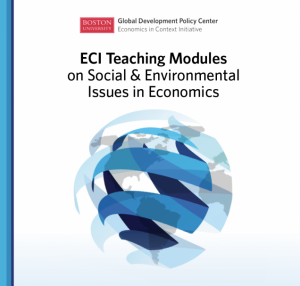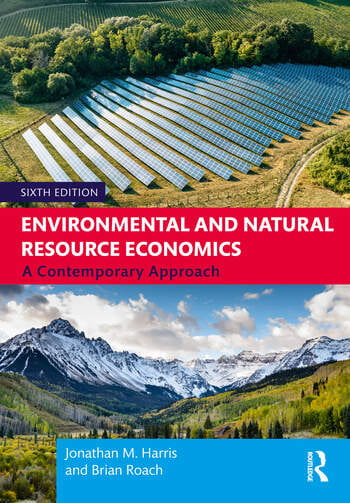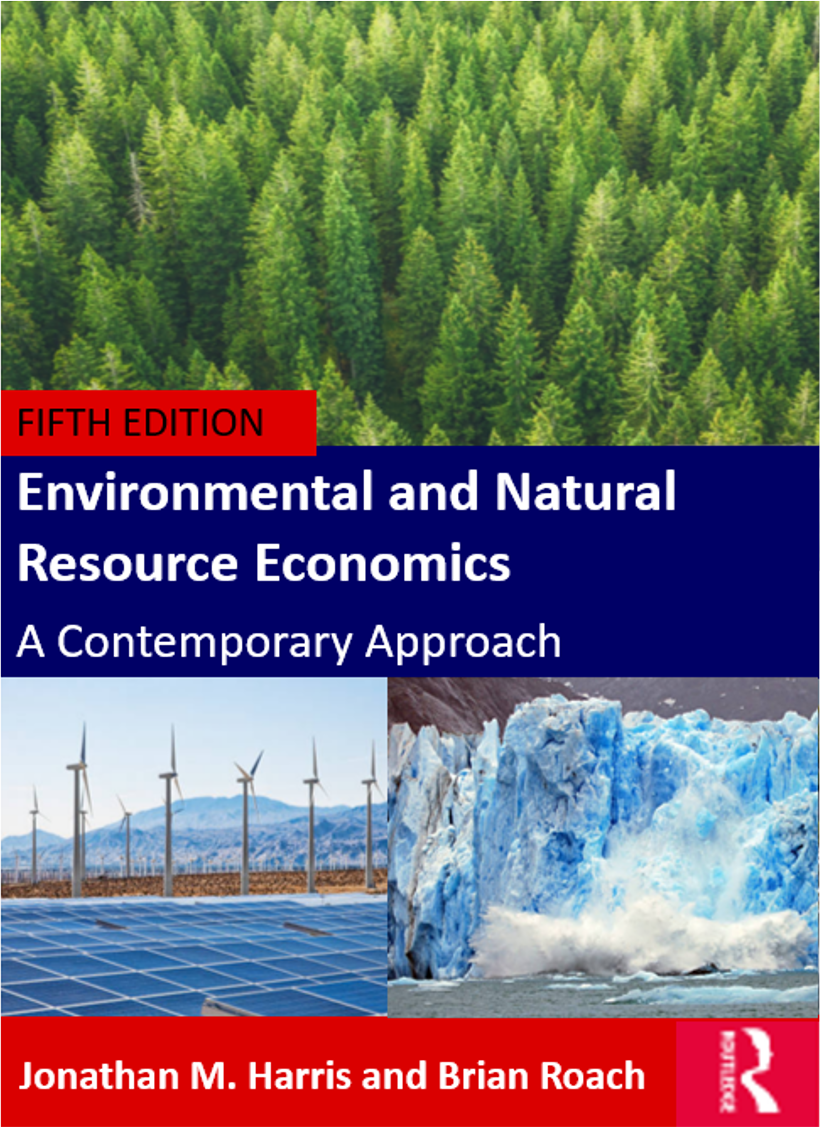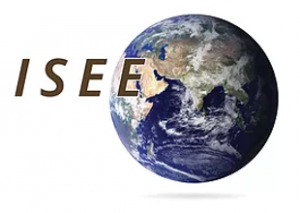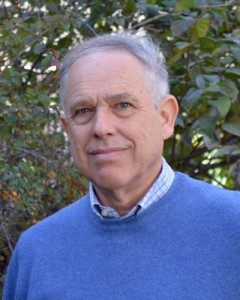Welcome to GDAE’s website
This website presents GDAE’s current research and educational efforts in 3 areas:
Environmental and Natural Resource Economics
Educational materials, including the “In Context” texts for Macroeconomics, Microeconomics, Principles of Economics and one-semester Essentials of Economics, as well as free teaching modules can now be accessed at their new location at the Economics in Context Initiative at Boston University’s Global Development Policy Center.
Publications reflecting GDAE’s earlier research in areas such as globalization, trade, and feminist economics, including Policy Briefs and Discussion papers, can be found in our Resource Directory.
All GDAE books and working papers are also available.
New from GDAE
Conference on Rights of Wetlands
GDAE Senior Researchers William Moomaw and Gillian Davies are participating in the free Rights of Wetlands online conference on March 4th, 2026, from 8 am – 10 am Eastern Standard Time.
The conference will have presentations from global Rights of Nature leaders and will present the 5-country (Bolivia, Ecuador, Guyana, Kenya, & Sri Lanka) project to operationalize the Rights of Wetlands under the Ramsar Convention on Wetlands of International Importance.
More information and Free Registration
New Edition of Environmental Text
The sixth edition of the text Environmental and Natural Resource Economics: A Contemporary Approach is now available! For a free exam copy, please contact Routledge Publishing. Two sample chapters are available: CHAPTER 2: RESOURCES, ENVIRONMENT, AND DEVELOPMENT and CHAPTER 11: ENERGY: THE GREAT TRANSITION
The sixth edition includes enhanced and updated material on energy, climate change, population, agriculture, forests, water, and other topics. As in previous editions, the text balances the analytical techniques of environmental economics with a pluralistic perspective from ecological economics, emphasizing practical policy solutions to modern environmental challenges.
New Climate Policy Brief
A new climate policy brief by Jonathan Harris and Grant Moore examines the results of the COP30 international climate conference held in Belém, Brazil in November 2025. The conference was marked by the absence of the United States, and struggled to advance global climate commitments over the opposition of fossil-fuel producing countries. Nonetheless there was some progress on climate finance, forest protection, and plans to strengthen implementation, with specific country commitments to phase-out coal, restore forests, transform food systems and sustainably manage the ocean. The policy brief evaluates the positive and negative outcomes of the conference, the gap between goals and commitments, and the road forward.
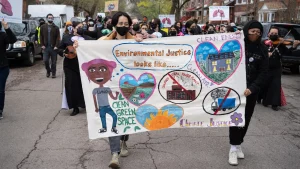 An updated teaching module on Environmental Justice: Income, Race, and Health by Rachel Massey, Meghan Maquet and Jonathan Harris is now available. The module illustrates the disproportionate environmental burdens faced by minority and low-income communities, using data and case studies. It explains the applications and limitations of economic analysis on topics such as valuing human life, the precautionary principle, and the distinction between efficiency and equity. Issues discussed include the Flint Michigan water crisis, Arctic pollution concerns, unequal impacts of global climate change and COVID-19, and international trade in E-wastes and plastic waste. Suggestions for more equitable environmental policies are presented.
An updated teaching module on Environmental Justice: Income, Race, and Health by Rachel Massey, Meghan Maquet and Jonathan Harris is now available. The module illustrates the disproportionate environmental burdens faced by minority and low-income communities, using data and case studies. It explains the applications and limitations of economic analysis on topics such as valuing human life, the precautionary principle, and the distinction between efficiency and equity. Issues discussed include the Flint Michigan water crisis, Arctic pollution concerns, unequal impacts of global climate change and COVID-19, and international trade in E-wastes and plastic waste. Suggestions for more equitable environmental policies are presented.
 Jonathan Harris and Brian Roach gave a remote presentation at Nelson Mandela University in South Africa on October 22, 2024, entitled: Ecological Economics, Energy, and Climate: New Paradigms for the Future. The presentation included discussion of the global transition to renewable energy, with a specific focus on South Africa’s move away from heavy coal dependence to greater deployment of solar and wind power.
Jonathan Harris and Brian Roach gave a remote presentation at Nelson Mandela University in South Africa on October 22, 2024, entitled: Ecological Economics, Energy, and Climate: New Paradigms for the Future. The presentation included discussion of the global transition to renewable energy, with a specific focus on South Africa’s move away from heavy coal dependence to greater deployment of solar and wind power.
 The second edition of the textbook Essentials of Economics in Context is now available.
The second edition of the textbook Essentials of Economics in Context is now available.
The text is specifically designed to meet the requirements of a one-semester introductory economics course.
“Essentials of Economics in Context allows students to explore the fundamentals of economic theory within the real-world context of contemporary economic issues. Students appreciate seeing the theory come to life, with applications to crucial topics like the environment, inequality, financialization, and many more pressing issues.” – Anastasia Wilson, Assistant Professor, Hobart and William Smith Colleges
 Jonathan Harris has published an article on “The State of Global Climate Policy in 2024 and the Road to Baku and Beyond”. Harris reviews the recent record of record-breaking climate extremes, the “Global Stock Take” on climate policy at the 2023 U.N. conference in Dubai, and looks at the prospects for strengthening climate policy in the run-up to the 2024 climate conference in Baku, Azerbaijan.
Jonathan Harris has published an article on “The State of Global Climate Policy in 2024 and the Road to Baku and Beyond”. Harris reviews the recent record of record-breaking climate extremes, the “Global Stock Take” on climate policy at the 2023 U.N. conference in Dubai, and looks at the prospects for strengthening climate policy in the run-up to the 2024 climate conference in Baku, Azerbaijan.
 GDAE Co-Director Bill Moomaw, Professor Emeritus Beverly Law of Oregon State University, and Dominick Della Salla, Chief Scientist at Wild Heritage, initiated a letter to President Biden and other administration officials calling for a moratorium on harvesting Mature and Old Growth Forests on public lands until revised forest management plans are developed. The letter garnered signatures of 195 Ph.D. scientists from the fields of climate change, forest ecology, and the carbon cycle. See details on signatories and supporting materials.
GDAE Co-Director Bill Moomaw, Professor Emeritus Beverly Law of Oregon State University, and Dominick Della Salla, Chief Scientist at Wild Heritage, initiated a letter to President Biden and other administration officials calling for a moratorium on harvesting Mature and Old Growth Forests on public lands until revised forest management plans are developed. The letter garnered signatures of 195 Ph.D. scientists from the fields of climate change, forest ecology, and the carbon cycle. See details on signatories and supporting materials.
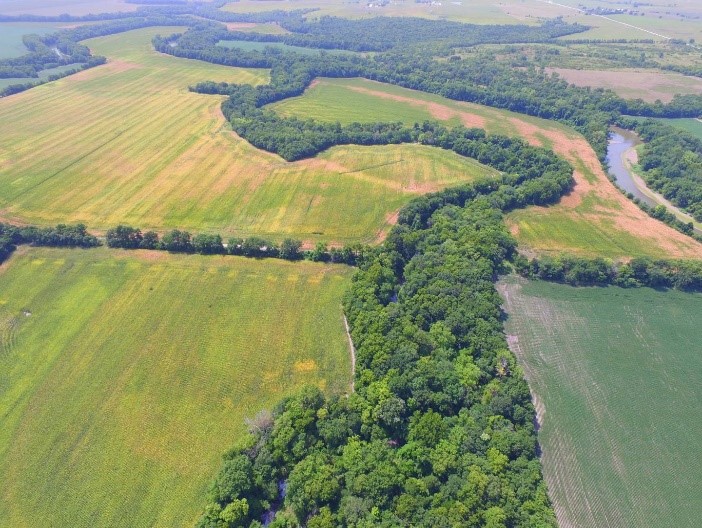 GDAE Co-Director Neva Goodwin is co-author on an article in The Lancet: Ecosystem Restoration is Integral to Humanity’s Recovery from Covid-19. Goodwin and co-authors argue that ecosystem restoration—the repair of ecosystems that have been degraded—relates directly to tackling the health and socioeconomic burdens of COVID-19, because stable and resilient ecosystems are fundamental determinants of health and socioeconomic stability.
GDAE Co-Director Neva Goodwin is co-author on an article in The Lancet: Ecosystem Restoration is Integral to Humanity’s Recovery from Covid-19. Goodwin and co-authors argue that ecosystem restoration—the repair of ecosystems that have been degraded—relates directly to tackling the health and socioeconomic burdens of COVID-19, because stable and resilient ecosystems are fundamental determinants of health and socioeconomic stability.
 A recent article in The Guardian: “Fighting a Huge Monster: Mine Battle in Guatemala became a Playbook for Polluters” discusses a long saga in which “indigenous defenders opposing the Marlin mine were criminalized by a corporation and its state allies.” GDAE researchers published an earlier article on the Marlin Mine: Searching for Gold in the Highlands of Guatemala: Economic Benefits and Environmental Risks of the Marlin Mine by Lyuba Zarsky and Leonardo Stanley, arguing that “local benefits are a tiny fraction of total mine revenues and earnings, the bulk of which flow overseas to the company and its shareholders” while “environmental risk at Marlin is exceptionally high and likely to increase over the remaining life of the mine and into the post-closure phase.” Spanish version and Journal of Economic Development article.
A recent article in The Guardian: “Fighting a Huge Monster: Mine Battle in Guatemala became a Playbook for Polluters” discusses a long saga in which “indigenous defenders opposing the Marlin mine were criminalized by a corporation and its state allies.” GDAE researchers published an earlier article on the Marlin Mine: Searching for Gold in the Highlands of Guatemala: Economic Benefits and Environmental Risks of the Marlin Mine by Lyuba Zarsky and Leonardo Stanley, arguing that “local benefits are a tiny fraction of total mine revenues and earnings, the bulk of which flow overseas to the company and its shareholders” while “environmental risk at Marlin is exceptionally high and likely to increase over the remaining life of the mine and into the post-closure phase.” Spanish version and Journal of Economic Development article.
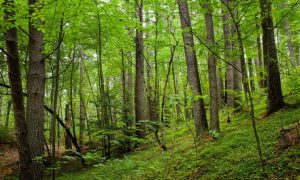 New publications by GDAE Co-Director William Moomaw and colleagues include Protecting large trees for climate mitigation, biodiversity, and forest resilience , The importance of natural forest stewardship in adaptation planning in the United States, and Creating Strategic Reserves to Protect Forest Carbon and Reduce Biodiversity Losses in the United States which show how natural forests provide ecological complexity, carbon storage, and water retention, and call for preserving preserving 30 to 50% of U.S. forested lands. Moomaw and colleagues also published an article on Does wood bioenergy help or harm the climate? arguing that wood bioenergy is not carbon-neutral, elevating atmospheric CO2 levels for up to 100 years. Moomaw and colleagues also published op-eds in The Boston Globe and The Conversation calling for policies to protect mature forests.
New publications by GDAE Co-Director William Moomaw and colleagues include Protecting large trees for climate mitigation, biodiversity, and forest resilience , The importance of natural forest stewardship in adaptation planning in the United States, and Creating Strategic Reserves to Protect Forest Carbon and Reduce Biodiversity Losses in the United States which show how natural forests provide ecological complexity, carbon storage, and water retention, and call for preserving preserving 30 to 50% of U.S. forested lands. Moomaw and colleagues also published an article on Does wood bioenergy help or harm the climate? arguing that wood bioenergy is not carbon-neutral, elevating atmospheric CO2 levels for up to 100 years. Moomaw and colleagues also published op-eds in The Boston Globe and The Conversation calling for policies to protect mature forests.
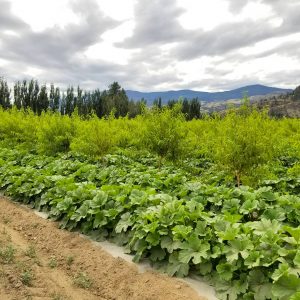 GDAE has cosponsored the third symposium of the Northeast Healthy Soil Network. With high-level panels including experts and practitioners from the US and Europe, the symposium brought together participants from academia, NGOs, and the private sector to create a sustained platform for farmers and other healthy soils stakeholders and advocates in the Northeast region. See full symposium report including presentations, videos, and policy brief summarizing issues in regenerative agriculture from the international to the local level.
GDAE has cosponsored the third symposium of the Northeast Healthy Soil Network. With high-level panels including experts and practitioners from the US and Europe, the symposium brought together participants from academia, NGOs, and the private sector to create a sustained platform for farmers and other healthy soils stakeholders and advocates in the Northeast region. See full symposium report including presentations, videos, and policy brief summarizing issues in regenerative agriculture from the international to the local level.
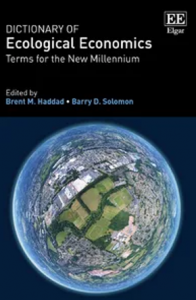 GDAE Researchers Jonathan Harris and Neva Goodwin are contributors to the Elgar Dictionary of Ecological Economics: Terms for the New Millennium, edited by Brent Haddad and Barry Solomon. The Dictionary “provides an intellectual roadmap to this evolving subject ranging from the practical to the philosophical”. Jonathan Harris is also author of an entry on “Green Economy” in the Elgar Encyclopedia of Ecological Economics (Edward Elgar Publishing, 2023, Emilio Padilla Rosa and Jesús Ramos Martin eds.) which “provides an expansive list of topics including sustainable development, the limits to growth, agroecology, implications of thermodynamic laws for economics, integrated ecologic-economic modelling, valuation of natural resources and services, and renewable and non-renewable resources management.”
GDAE Researchers Jonathan Harris and Neva Goodwin are contributors to the Elgar Dictionary of Ecological Economics: Terms for the New Millennium, edited by Brent Haddad and Barry Solomon. The Dictionary “provides an intellectual roadmap to this evolving subject ranging from the practical to the philosophical”. Jonathan Harris is also author of an entry on “Green Economy” in the Elgar Encyclopedia of Ecological Economics (Edward Elgar Publishing, 2023, Emilio Padilla Rosa and Jesús Ramos Martin eds.) which “provides an expansive list of topics including sustainable development, the limits to growth, agroecology, implications of thermodynamic laws for economics, integrated ecologic-economic modelling, valuation of natural resources and services, and renewable and non-renewable resources management.”
 A new teaching module on Agriculture and Climate by Anne-Marie Codur, Jonathan Harris and Kayleigh Fay focuses on the crucial role of the world’s soils in the global carbon cycle. While the global agricultural system is currently a major net contributor to greenhouse gas emissions, this module offers a detailed analysis of the potential for transforming agriculture into a climate solution. The module shows that reducing industrial emissions will not be enough to achieve climate goals without substantial additional carbon sequestration in agricultural soils, forests, and wetlands.
A new teaching module on Agriculture and Climate by Anne-Marie Codur, Jonathan Harris and Kayleigh Fay focuses on the crucial role of the world’s soils in the global carbon cycle. While the global agricultural system is currently a major net contributor to greenhouse gas emissions, this module offers a detailed analysis of the potential for transforming agriculture into a climate solution. The module shows that reducing industrial emissions will not be enough to achieve climate goals without substantial additional carbon sequestration in agricultural soils, forests, and wetlands.
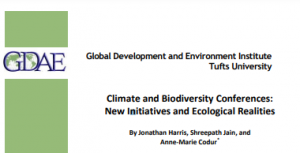 A new climate policy brief by Jonathan Harris, Shreepath Jain, and Anne-Marie Codur addresses the recent United Nations conferences on climate and biodiversity in November and December 2022. This policy brief reviews both the accomplishments and the shortcomings of the two conferences, bringing an ecological economics perspective to bear on the challenge of “filling the climate gap” with natural solutions.
A new climate policy brief by Jonathan Harris, Shreepath Jain, and Anne-Marie Codur addresses the recent United Nations conferences on climate and biodiversity in November and December 2022. This policy brief reviews both the accomplishments and the shortcomings of the two conferences, bringing an ecological economics perspective to bear on the challenge of “filling the climate gap” with natural solutions.
 GDAE Senior Researcher Jonathan Harris participated in a podcast on Healthy Living Healthy Planet Radio on “The Politics of Climate Change and How it Affects our Economic Future” (Episode 146). Other participants were Dr. Barry Rabe of the University of Michigan and Dana Nuccitelli, research coordinator for the Citizens Climate Lobby. The podcast focused on the economic costs of climate change and on policy initiatives to respond to climate change, especially the recent Infrastructure and Jobs Act and Inflation Reduction Act. Listen to the podcast.
GDAE Senior Researcher Jonathan Harris participated in a podcast on Healthy Living Healthy Planet Radio on “The Politics of Climate Change and How it Affects our Economic Future” (Episode 146). Other participants were Dr. Barry Rabe of the University of Michigan and Dana Nuccitelli, research coordinator for the Citizens Climate Lobby. The podcast focused on the economic costs of climate change and on policy initiatives to respond to climate change, especially the recent Infrastructure and Jobs Act and Inflation Reduction Act. Listen to the podcast.
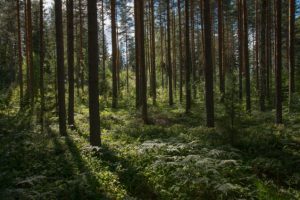 A new teaching module on Forests and Climate: Economics and Policy Issues by Anne-Marie Codur, Jonathan Harris, and Maliheh Birjandi-Feriz, focuses on a crucial topic in climate policy. Deforestation and degradation of forests and wetlands is a major contributor to climate change. At the same time, forests and other ecosystems have immense capacity to store carbon and to contribute to balancing global cycles of carbon dioxide, methane, and other greenhouse gases. The module analyzes the causes of deforestation and degradation as well as the potential for reversing these trends to achieve protection and expansion of forests and wetlands.
A new teaching module on Forests and Climate: Economics and Policy Issues by Anne-Marie Codur, Jonathan Harris, and Maliheh Birjandi-Feriz, focuses on a crucial topic in climate policy. Deforestation and degradation of forests and wetlands is a major contributor to climate change. At the same time, forests and other ecosystems have immense capacity to store carbon and to contribute to balancing global cycles of carbon dioxide, methane, and other greenhouse gases. The module analyzes the causes of deforestation and degradation as well as the potential for reversing these trends to achieve protection and expansion of forests and wetlands.
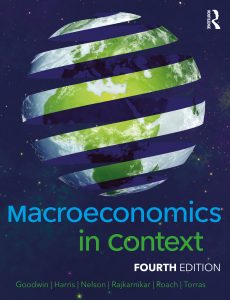 New editions of the textbooks Microeconomics in Context and Macroeconomics in Context is now available, offering a full treatment of standard topics matched with analysis of the economic challenges of the 21st century within social and environmental contexts. Preview sample chapters and Request Exam Copy of Macroeconomics In Context and Microeconomics in Context from Routledge Publishing.
New editions of the textbooks Microeconomics in Context and Macroeconomics in Context is now available, offering a full treatment of standard topics matched with analysis of the economic challenges of the 21st century within social and environmental contexts. Preview sample chapters and Request Exam Copy of Macroeconomics In Context and Microeconomics in Context from Routledge Publishing.
New Edition of Environmental and Natural Resource Economics
November 15, 2021
The fifth edition of Environmental and Natural Resource Economics: A Contemporary Approach has been published! This text balances coverage of standard environmental economics topics with broader ecological economics analysis and a global perspective on current issues such as global climate change, the transition to renewable energy, “green” national income accounting, population growth, agricultural sustainability, and natural resource systems. The new edition deals with the fast-changing economics of energy and climate, the rapid expansion of renewable energy, and issues of land management, as well as updating all data and presenting recent research on environmental issues. Two sample chapters are available.
 GDAE Senior Researcher Jonathan Harris was interviewed by Healthy Living Healthy Planet Radio for an episode on the Economics of Climate Change, together with Dr. Richard Tol of the University of Sussex. The podcast (Episode 98) is available at https://www.healthylivinghealthyplanetradio.com/listen-online Topics discussed included the health and economic impacts of climate change , economic policies for responding to climate change, expanding renewable energy, and developing climate resilience.
GDAE Senior Researcher Jonathan Harris was interviewed by Healthy Living Healthy Planet Radio for an episode on the Economics of Climate Change, together with Dr. Richard Tol of the University of Sussex. The podcast (Episode 98) is available at https://www.healthylivinghealthyplanetradio.com/listen-online Topics discussed included the health and economic impacts of climate change , economic policies for responding to climate change, expanding renewable energy, and developing climate resilience.
GDAE Researchers Present at Ecological Economics/Degrowth Conference
July 13, 2021
GDAE Researchers presented at the Online Joint Conference of the International Society for Ecological Economics, the European Society for Ecological Economics, and the international degrowth research networks, hosted by University of Manchester, UK, 5th-8th July 2021.
GDAE presentations included:
Anne-Marie Codur and Sam Polzin, Farmers as Ecosystem Regenerators: A Case Study of the Northeast Healthy Soil Network.
Jonathan Harris, Getting to Net Zero: Ecological Economics Can Help.
Brian Roach, Jonathan Harris, and Anne-Marie Codur, Teaching Ecological Economics: Energy, Climate, Growth, and Degrowth and Changing Economics of Renewable Energy.
The presentations emphasized lessons from the preparation of the fifth edition of Environmental and Natural Resource Economics: A Contemporary Approach: the increasing evidence of the severity and urgency of climate change, increased ambition for carbon reduction goals, and the essential role of renewable energy, energy efficiency, and carbon storage in soils and forests in achieving these goals.
Forum on Green and Blue New Deals
April 23, 2021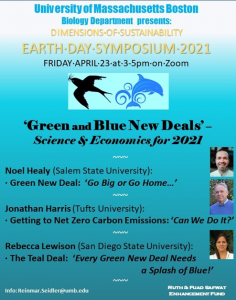
GDAE Senior Researcher Jonathan Harris participated in a symposium sponsored by the University of Massachusetts at Boston on Green and Blue New Deals: Science and Economics for 2021. Noel Healy (Salem State University) and Rebecca Lewison (San Diego State University) joined Dr. Harris with presentations on policy responses to the climate emergency. Dr. Healy’s talk was entitled “Green New Deal: Go Big or Go Home”, stressing the importance of a large-scale program with a focus on climate and economic justice. Dr. Harris’s presentation on “Getting to Net Zero Carbon Emissions: Can We Do It?” surveyed the potential of renewable energy, energy efficiency, and carbon storage in forests, grasslands, wetlands, and agricultural soils. Dr. Lewison emphasized the many ways in which healthy ocean ecosystems are key to climate stabilization. View the webinar. See Dr. Harris’s Powerpoint presentation.
GDAE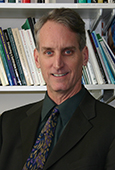
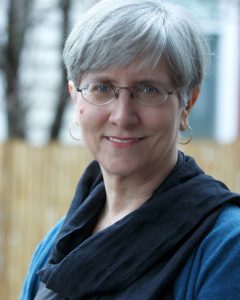 Researcher
Researcher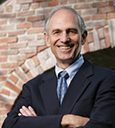 s have new published work on important frontier areas in economics and ecology. Senior Research Fellow Timothy A. Wise has a new article on the promise of ecological agriculture in Africa, as well as the social and ecological damage from intensive agribusiness. See original article and other work by Wise on the promise of ecological agriculture in Africa, as well as the social and ecological damage from intensive agribusiness. (See other recent work by Wise.)
s have new published work on important frontier areas in economics and ecology. Senior Research Fellow Timothy A. Wise has a new article on the promise of ecological agriculture in Africa, as well as the social and ecological damage from intensive agribusiness. See original article and other work by Wise on the promise of ecological agriculture in Africa, as well as the social and ecological damage from intensive agribusiness. (See other recent work by Wise.)
GDAE Co-Director William Moomaw is featured in a New Yorker article by Bill McKibben who cites Moomaw’s research on “proforestation”— growing existing forests intact to their ecological potential—as an alternative to unsustainable policies of burning biomass. See the original article by Moomaw et al. and a summary in EnviroBites.
Senior Research Fellow Julie A. Nelson discusses issues of economics, gender, and community knowledge in two recent articles on “Economics, Considered” and “Economics and Community Knowledge-Making”. Dr. Nelson is one of the founders of feminist economics and presents feminist perspectives on the economics of care, ecological economics, behavioral economics, and the theory of the firm.
Climate Change, Social Equity, and the Green New Deal
August 14, 2020
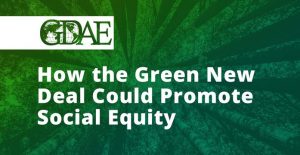 GDAE Senior Researcher Jonathan Harris is quoted extensively in a new article on social equity and the Green New Deal. He argues that the political presentation of the Green New Deal has improved, stressing its practical advantages especially for low-income earners. A Green New Deal has the potential to create millions of jobs, while employing policy measures that are low cost and can have immediate impact. The COVID crisis increases the urgency of a broad Federal response both to unemployment and to the health crisis. The article builds on an earlier presentation about Transitioning to a Low-Carbon Economy. See also Harris’s policy brief on Ecological Economics of the Green New Deal and other research by GDAE on Green Economics.
GDAE Senior Researcher Jonathan Harris is quoted extensively in a new article on social equity and the Green New Deal. He argues that the political presentation of the Green New Deal has improved, stressing its practical advantages especially for low-income earners. A Green New Deal has the potential to create millions of jobs, while employing policy measures that are low cost and can have immediate impact. The COVID crisis increases the urgency of a broad Federal response both to unemployment and to the health crisis. The article builds on an earlier presentation about Transitioning to a Low-Carbon Economy. See also Harris’s policy brief on Ecological Economics of the Green New Deal and other research by GDAE on Green Economics.
Jonathan Harris awarded Herman Daly Award
August 2019
At the USSEE conference, Jonathan Harris was awarded the Herman Daly Award “designed to recognize individuals who have connected ecological economic thinking to practical applications and implementation of solutions that are sustainable in scale, equitable in distribution and efficient in allocation.” Read more about the award.
In the News
 GDAE Co-Director William Moomaw and Juliette Rooney-Varga call for protection of mature U.S. forests US Forest Service should let forests grow – The Boston Globe on December 13, 2022
GDAE Co-Director William Moomaw and Juliette Rooney-Varga call for protection of mature U.S. forests US Forest Service should let forests grow – The Boston Globe on December 13, 2022
 GDAE Co-Director William Moomaw and Beverley Law question the implementation of President Biden’s executive order on conserving mature and old-growth forests on Federal lands, citing contradictory agency policies. The Biden administration has called for protecting mature US forests to slow climate change, but it’s still allowing them to be logged. March 9, 2022
GDAE Co-Director William Moomaw and Beverley Law question the implementation of President Biden’s executive order on conserving mature and old-growth forests on Federal lands, citing contradictory agency policies. The Biden administration has called for protecting mature US forests to slow climate change, but it’s still allowing them to be logged. March 9, 2022
 GDAE was cited by CardRates in “Climate Change and Social Equity: How the Green New Deal Could Both Protect the Environment and Benefit Low-Income Earners” on August 11, 2020.
GDAE was cited by CardRates in “Climate Change and Social Equity: How the Green New Deal Could Both Protect the Environment and Benefit Low-Income Earners” on August 11, 2020.

GDAE Visiting Scholar David Sussman presents some of the limitations of banning plastic bags in his July 17, 2020 article in The Conversation .
 GDAE was cited by CardRates in “Transitioning to a Low-Carbon Economy: Why a Green New Deal Initiative Could Produce Economic and Environmental Benefits” on May 12, 2020.
GDAE was cited by CardRates in “Transitioning to a Low-Carbon Economy: Why a Green New Deal Initiative Could Produce Economic and Environmental Benefits” on May 12, 2020.
William Moomaw was cited by The Washington Post in “More than 11,000 scientists from around the world declare a ‘climate emergency’” on November 5, 2019.
William Moomaw was cited by The New Yorker in “Don’t Burn Trees to Fight Climate Change — Let Them Grow” on August 15, 2019
![]() William Moomaw was cited by National Geographic in “Trees release flammable methane—here’s what that means for climate” on March 25, 2019.
William Moomaw was cited by National Geographic in “Trees release flammable methane—here’s what that means for climate” on March 25, 2019.
 William Moomaw was cited by WGBH in “Are We Cutting Down The Wrong Trees In Massachusetts?” on June 25, 2019
William Moomaw was cited by WGBH in “Are We Cutting Down The Wrong Trees In Massachusetts?” on June 25, 2019
About
The Global Development And Environment Institute (GDAE) is a research institute at Tufts University dedicated to promoting a better understanding of how societies can pursue their economic and community goals in an environmentally and socially sustainable manner. GDAE pursues its mission through original research, policy work, publication projects, curriculum development, conferences and other activities.

